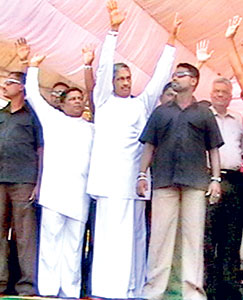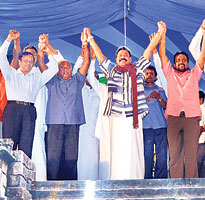An estimated one million people do not have National Identity Cards or other forms of identity papers to vote at Tuesday’s Presidential election, officials and independent poll monitors said yesterday. Elections Commissioner Dayananda Dissanayake declared that only about 200,000 people had applied for the temporary NICs that would enable them to vote as the deadlines ended.
He said the registration of such people was carried out on two fronts. One by the Elections Commissioner’s Office and the other by the Department for the Registration of Persons. “It appears that there had been a lack of interest on the part of the people,” he said.
 |
|
| Presidential candidates Mahinda Rajapaksa and Sarath Fonseka winding up their election campaign yesterday. Left: President Rajapaksa is seen at his final rally in Piliyandala. Pic by Gemunu Wellage. Right: General Fonseka at the Maradana meeting. Pic by J. Weerasekera. |
The commissioner said some 180,000 temporary NICs issued for the previous elections held last year could be used for Tuesday’s elections. “However, these cards would be retained by the election officials, he said.
At the last count in 2008 it was revealed that some 10 percent of the registered 14 million voters or 1.9 million of the population had not entered their NIC numbers on the election registration lists.
“However this does not mean all of them do not have their NICs. It could be that many had considered it unimportant to enter the number on the registration form for various reasons. The bottom line is that any person with the NIC is still eligible to cast his or her vote,” Mr. Dissanayake pointed.
He said there was also provision for people to use lternative identification documents such as a passport or a driving licence.
A spokesman for the People’s Action for Free and Fair Elections said: “At the end of the day it could be easily said that at least a million voters, if not more would be put out in the cold despite efforts by the authorities to issue temporary NICs in a rush before the elections”.
PAFFREL spokesman Rohana Hettiaarachchi said the most affected were people in the Northern Province, with some 65 percent without their NICs, followed by a 23 percent in Trincomalee, 22 percent in Batticoloa, 20 percent in the Matara district and 20 percent in the Moneragala district.
“Even though there is the option to use the driving licence, passport or other forms of identification as a substitute for the NIC, still the number of those who will not be able to vote will be high,” he said.
Centre for Free and Fair Elections (CaFFE) Director Keerthi Tenakoon said that when the figures put out by the authorities were summed up it was clear that more than a million people would not be able to vote on Tuesday.
Another pressing problem in this regard is the plantation sector. “A large number of people in this sector, particularly the older generation do not have birth certificates. As a result they get nowhere in obtaining temporary NICs or whatever,” he said.
“In addition to that out of an estimated 300,000 Internally Displaced People (IDPs) in the north only some 42,000 persons have registered to vote,” he added.
He blamed the authorities for failing to address the issue in time instead of waiting for the election.
|



